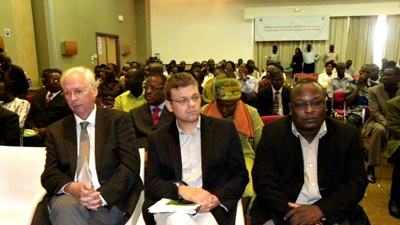COTONOU, Benin, March 26, 2012 - Two new projects designed to boost agricultural diversification and productivity in Benin have officially launched, moving the West African country closer to food security through greater use of improved agricultural knowledge and technology.
Nearly 200 people joined Sabai Kate, the Minister of Agriculture, Livestock and Fisheries, for the launching of the West Africa Agricultural Productivity Program for Benin (WAAPP-Benin) and the Agricultural Productivity and Diversification Project (PADA). World Bank Country Manager Olivier Fremond, as well as many regional, local and country agricultural stakeholders also attended the ceremony.
Co-financed by the World Bank, a multi-donor trust fund, and the Benin government, the WAAPP-Benin and PADA are two complementary projects. WAAPP-Benin is a regional program aimed at increasing productivity of priority crops, particularly corn, in West Africa in an effective and sustainable manner. Funded at more than CFAF eight billion, this five-year project will also support regional cooperation in agriculture and promote research and dissemination of agricultural knowledge.
The primary aim of PADA is to restore and boost productivity and strengthen the value chains of such crops as rice, corn, pineapples, cashew nuts, as well as, fish products. As a result of PADA, more than 165,000 direct beneficiaries, 40 percent of whom are women, will be able to utilize improved agricultural technologies in the main sectors targeted. Other expected project outcomes include the annual additional production of 60,000 metric tons of husked rice, the increase in the exports of cashew nuts by more than 80 percent (from 25 to 44 thousand metric tons) and the improvement of pineapple yield by 20 percent, from 50 to of 60 thousand metric tons per hectare in the zones covered by the project.
PADA also supports the implementation of the government’s national strategy to improve productivity and agricultural diversification. The project will contribute to expanding access by beneficiaries (farmers, fish farmers, fishermen, livestock producers, the agro-industrial sector, and professional and inter-professional organizations) to improved technologies, production infrastructure (small-scale irrigation systems), and market infrastructure (warehouses and cold storage facilities). All project activities will be conducted by public or private entities through partnership agreements or contracts.
The launch event was followed by a technical workshop led by the Programme Cadre d’Appui à la Diversification Agricole, ProCAD, which is the management unit of the two new projects. The workshop brought all actors in the agricultural field, from representatives of producer organizations to directors of regional centers for agricultural promotion, representatives of civil society organizations and NGOs working in the agricultural sector, the technical directorates of the Ministry of Agriculture, Livestock and Fisheries and the private sector.
“Agricultural activities take place in the field rather than in offices,” said Dr. Pamphile Tobada on behalf of the Regional Centers for Agricultural Promotion. “The technical launching of the WAAPP and PADA projects has enabled us to appreciate the serious approach that must be demonstrated so as to ensure that WAAPP and PADA are not viewed merely as two additional projects.”
The workshop provided an opportunity for participants to better understand the objectives and outcomes of each of the two projects, as well as their principles, strategies, implementation tools, and main components. The institutional framework of the two projects, their monitoring and evaluation systems, procurement rules, and environmental and social safeguard clauses were also reviewed.
“On behalf of all the organizations in the pineapple, rice, corn, cashew nut, and fish farming sector, we would like to thank ProCAD for including us in preparatory activities,” said Athanase Akpoe, pineapple producer and secretary general of the National Forum for Farming and Producer Organizations in Benin. “At a time when thought is being given to project implementation procedures, our participation in the technical launching represents a golden opportunity for us to clearly articulate our ideas on the support that farming and producer organizations intend to provide to achieve the objectives of the two projects implemented under ProCAD.”

